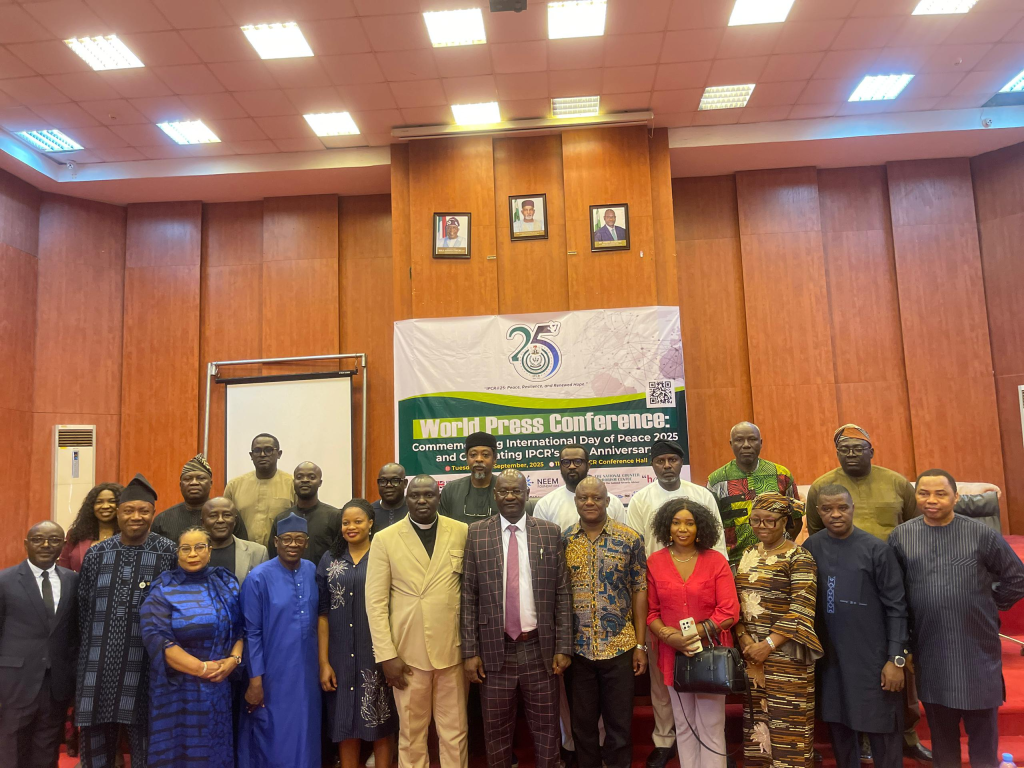….as Institute marks 25th anniversary, International Day of Peace
….IPCR to launch National Peace Academy, train one million Nigerians
By Favour Ulebor, Abuja
The Director-General of the Institute for Peace and Conflict Resolution (IPCR), Dr. Joseph Ochogwu, has warned that Nigeria risks becoming a centre for rogue actors in the Sahel if the Federal Government, states and local governments fail to prioritise conflict prevention.
Ochogwu made the call on Tuesday in Abuja during a world press conference to commemorate the 2025 International Day of Peace, with the theme “Act Now for a Peaceful World”, and to celebrate the 25th anniversary of IPCR as Nigeria’s apex peacebuilding institution.
According to him, Nigeria cannot afford to ignore the early signs of violent conflict.
Ochogwu reflected on the 25-year journey of IPCR, established in 2000 under the supervision of the Ministry of Foreign Affairs, highlighting its interventions in electoral violence, farmer-herder conflicts, communal crises, and its contributions to international peacebuilding through partnerships with the AU, ECOWAS, UN and other agencies.
He said IPCR pioneered the Early Warning System now adopted by ECOWAS and AU, convened the roundtable that birthed the Niger Delta amnesty programme, developed peace and conflict curricula with the National Universities Commission, and produced research that informed national and regional policies.
According to him, the institute also advanced Nigeria’s National Action Plan on Women, Peace and Security, and is currently working with the Office of the Head of Service to scale up reconciliation and forgiveness training across the civil service.
He further revealed that IPCR is launching a National Peace Academy that will provide free online training for one million Nigerians on peace, justice, and reconciliation, with certification.
He said, “Government at all levels must prioritise conflict prevention, invest in peace-building infrastructure, and ensure that development policies are conflict-sensitive and inclusive. We must also strengthen early warning and response systems to prevent small conflicts from escalating into violent crises. We have a centre for all rogue actors in the Sahel, it’s Nigeria. So we cannot afford to let that happen.
“As part of our 25th anniversary celebration, we are promising to deliver customised training to Nigerians, one million Nigerians for free. They will be able to log in online, take formal courses on peace, justice and reconciliation, and they will be certified. We believe this will build a new generation of peace ambassadors across the country.
“The past 25 years have demonstrated that sustainable peace is possible when we act with determination, wisdom, and unity.”
Ochogwu also appealed to the Nigerian private sector to see peacebuilding as a critical area for investment.
He called on religious and traditional leaders to use their influence to promote tolerance, and on citizens to embrace their roles as peace ambassadors.
The DG emphasised the role of the media as a central partner in amplifying the voices of peace, urging conflict-sensitive reporting and balanced narratives.
“Once there is conflict, after women and children, the next to be affected is private businesses. The organized private sector must invest more in peacebuilding through responsible business practices, conflict-sensitive investments, and support for peace initiatives,” he said.
Outlining the programme of events, he said the Institute would hold interfaith prayers at the Central Mosque on September 19 and at the National Ecumenical Centre on September 21.
The celebrations would climax with a peace walk, commemorative lecture, and panel discussion on September 22.
Representing the CAN President, Daniel Okoh, the National Director for Education, Youth and Women Development at the Christian Association of Nigeria (CAN), Ozumba Emmanuel Nicodemus, congratulated the Institute and pledged continued partnership.
Speaking on behalf of StandSafe Society Against Drug and Substance Abuse (SSADASA), Josephine Etta, also lauded the Institute’s collaboration in fighting drug abuse, a root cause of violence.
“We believe that if we work together as individuals, as communities, as a people, we can actually bring peace home. Even perpetrators of violence desire peace one way or the other,” she said.
The post Nigeria at risk without conflict prevention — IPCR DG appeared first on Vanguard News.

